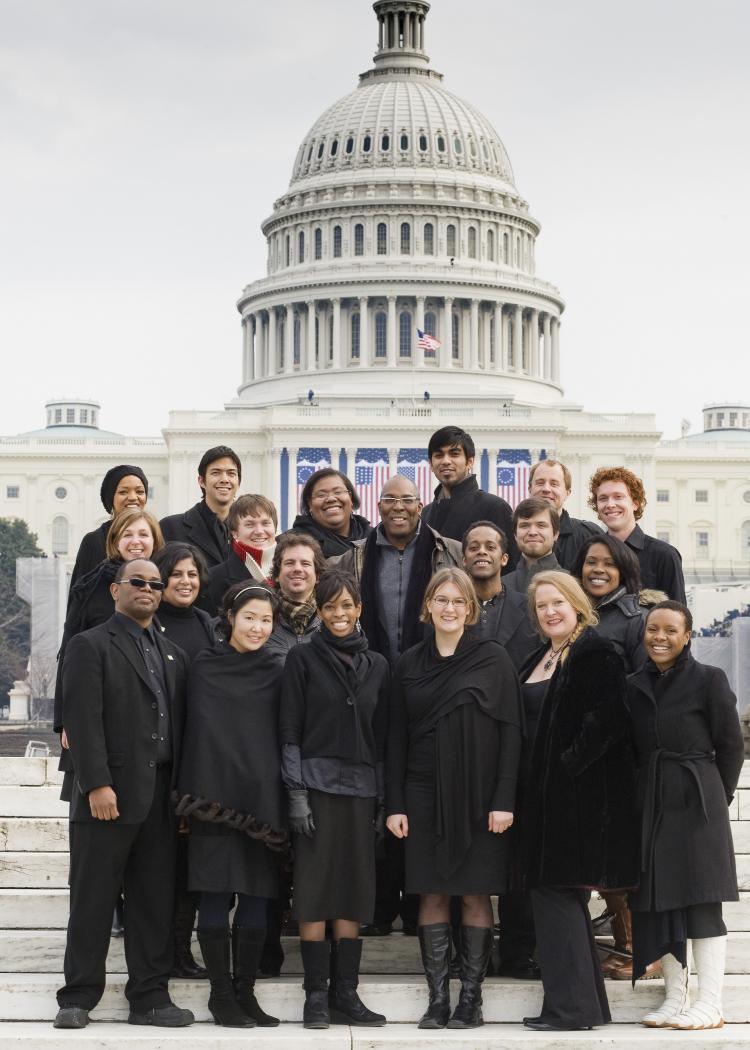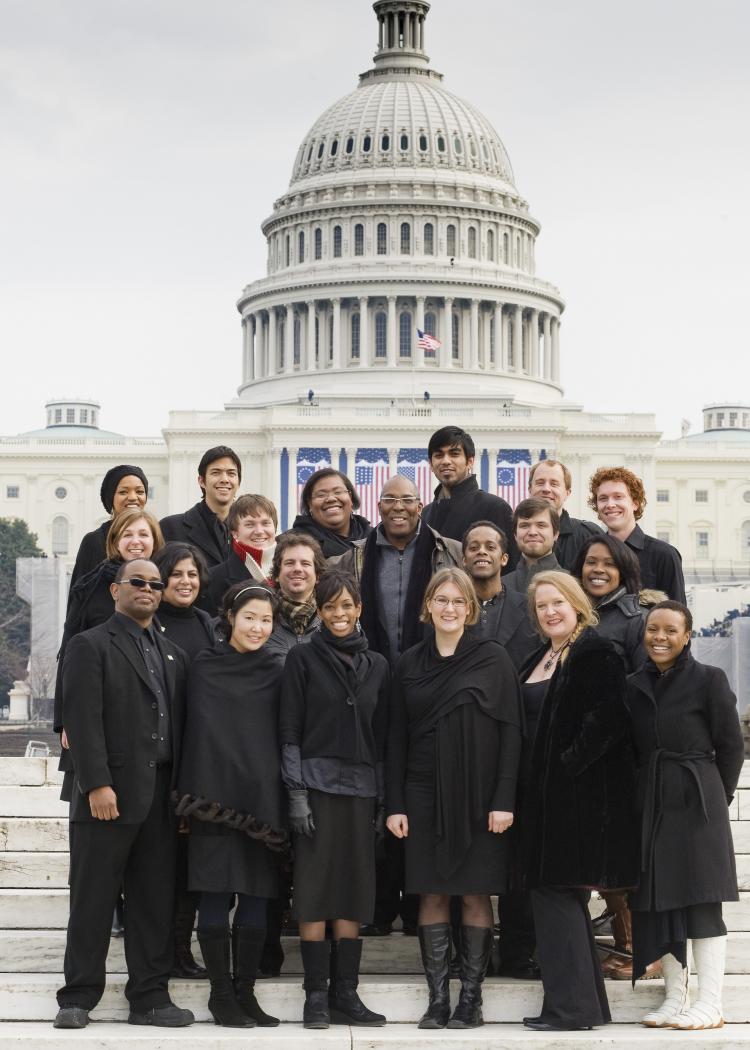When a work becomes “great music” written by a “great composer” it’s called canonization. Who decides what gets to make history and what passes into obscurity? We’d like to think quality is the deciding factor, but unfortunately that’s not always true. Often politics and all its prejudice decides what we listen to.
Plenty of canonization happens in the name of nationalism (or any other -ism) to this day, as does de-canonization. Your music may be great, and even popular, but the elite in the arts community and even government can decide that it doesn’t send the correct political message. As a result, you disappear. Until recently, many European women who were renowned composers in their time were systematically left out of history by the men writing it. This is still the case for the contributions of composers of African descent.
Great music from the past can disappear if you don’t dig to find it. Great music in the present is likewise hidden if it isn’t seen as trendy or profitable. So we should appreciate the Nathaniel Dett Chorale for digging up hidden African gold buried in the diaspora.
Small but mighty, the chorale is first and foremost a fantastic choir. This year’s incarnation has a beautiful and balanced blend. Mary Lou William’s avant-garde “St. Marin De Porres” was delivered with clean intonation and carefully sculpted dynamics. Didn’t know Williams wrote choral pieces? Neither did I until I heard the choir perform one. Betty Jackson King’s “Psalm 57” was an unexpected treasure with French Impressionist sparkles. James Furman’s “Hehlehlooyah” was vigorous and precise.
The program entitled And Still We Sing…Steel Singin’ was an inventive evening blending steel pan band with choral singing. It didn’t always work perfectly but when it did, it was nothing short of pantastic!
The steel band is a perilous instrument. It’s really hard to play. Chromatic notes are not beside each other like a keyboard or stringed instrument, but rather across from each other within the pan. Complicated melodies require lightning speed. Naturally, every pan player I’ve ever known must show off by playing complicated jazz and classical music with chromatic runs. Really they are a heady bunch.
Legacy Pan Groove, true to Trinidad’s intellectual pan tradition, gave us a wonderful “Night in Tunisia” with blistering solos by Talib Robinson and Gareth Burgess. The most insanely inventive moment was Robinson playing Paganini’s “Moto Perpetuo” on tenor pan with the entire choir singing the accompaniment on syllables. Wow. I’d like to see that again.
As noble and worthy a task as canonizing Afrocentric choral music is, the chorale does something even more valuable. Artistic director Brainerd Blyden-Taylor has successfully mined the talent in the choir itself.
At the reception before the concert, the choir presented two charming pieces composed by tenor and chorale member Akufuna Sifuba. Sifuba’s solid and well-crafted choral pieces are perfect for choirs seeking to broaden the scope of their repertoire. African choral music is so underrated, and here we have a young and little known composer writing very likable music. Teachers, stop running around looking for your black colleagues to help you during black history month. Here is a local guy who deserves a commission. Don’t wait until February to ask either. He’ll be booked up by then.
During the concert, assistant conductor Daryl Huggins composed and performed a couple of original old-school calypso pieces. Huggins’ clever lyrics were delivered with the wayward charm—ok, really the cheek—that makes a quality Calypsonian so entertaining. The jilted man’s lament “Blood Bank” made me laugh out loud almost as many times as the chorale’s tidy rendition of The Mighty Sparrow’s “Jean and Dinah.”
What’s so delicious about the Nathaniel Dett Chorale is the happiness. They move effortlessly from ultra-disciplined precision to loose and even bawdy reveling. They always look one hundred percent engaged.
My criticism? Why bother to put such pedestrian Bach and Handel pieces on the program? If you’re going to do dead white guy music, why not something more unusual? Yes Nathaniel Dett Chorale, we know you can sing anything. I would have liked another Betty Jackson King piece or better yet, a further exploration of continental Africa’s mountainous choral legacy.
There is a lot to look forward as the chorale presents its next season at the Glenn Gould Studio. It looks like a good year to buy a subscription. I’m particularly looking forward to February’s all-Creole concert featuring the poetic and musical traditions of Haiti and a new commission by Haitian composer Sydney Guillaume. The entire season will raise funds for Haiti—not for the bloated Red Cross, but for a small Haitian NGO that will buy “bricks and mortar” to build a single school. Even the chorale’s charitable endeavours are carefully researched, staying true to an Afrocentric ideal that is inclusive and heartfelt.
Plenty of canonization happens in the name of nationalism (or any other -ism) to this day, as does de-canonization. Your music may be great, and even popular, but the elite in the arts community and even government can decide that it doesn’t send the correct political message. As a result, you disappear. Until recently, many European women who were renowned composers in their time were systematically left out of history by the men writing it. This is still the case for the contributions of composers of African descent.
Great music from the past can disappear if you don’t dig to find it. Great music in the present is likewise hidden if it isn’t seen as trendy or profitable. So we should appreciate the Nathaniel Dett Chorale for digging up hidden African gold buried in the diaspora.
Small but mighty, the chorale is first and foremost a fantastic choir. This year’s incarnation has a beautiful and balanced blend. Mary Lou William’s avant-garde “St. Marin De Porres” was delivered with clean intonation and carefully sculpted dynamics. Didn’t know Williams wrote choral pieces? Neither did I until I heard the choir perform one. Betty Jackson King’s “Psalm 57” was an unexpected treasure with French Impressionist sparkles. James Furman’s “Hehlehlooyah” was vigorous and precise.
The program entitled And Still We Sing…Steel Singin’ was an inventive evening blending steel pan band with choral singing. It didn’t always work perfectly but when it did, it was nothing short of pantastic!
The steel band is a perilous instrument. It’s really hard to play. Chromatic notes are not beside each other like a keyboard or stringed instrument, but rather across from each other within the pan. Complicated melodies require lightning speed. Naturally, every pan player I’ve ever known must show off by playing complicated jazz and classical music with chromatic runs. Really they are a heady bunch.
Legacy Pan Groove, true to Trinidad’s intellectual pan tradition, gave us a wonderful “Night in Tunisia” with blistering solos by Talib Robinson and Gareth Burgess. The most insanely inventive moment was Robinson playing Paganini’s “Moto Perpetuo” on tenor pan with the entire choir singing the accompaniment on syllables. Wow. I’d like to see that again.
As noble and worthy a task as canonizing Afrocentric choral music is, the chorale does something even more valuable. Artistic director Brainerd Blyden-Taylor has successfully mined the talent in the choir itself.
At the reception before the concert, the choir presented two charming pieces composed by tenor and chorale member Akufuna Sifuba. Sifuba’s solid and well-crafted choral pieces are perfect for choirs seeking to broaden the scope of their repertoire. African choral music is so underrated, and here we have a young and little known composer writing very likable music. Teachers, stop running around looking for your black colleagues to help you during black history month. Here is a local guy who deserves a commission. Don’t wait until February to ask either. He’ll be booked up by then.
During the concert, assistant conductor Daryl Huggins composed and performed a couple of original old-school calypso pieces. Huggins’ clever lyrics were delivered with the wayward charm—ok, really the cheek—that makes a quality Calypsonian so entertaining. The jilted man’s lament “Blood Bank” made me laugh out loud almost as many times as the chorale’s tidy rendition of The Mighty Sparrow’s “Jean and Dinah.”
What’s so delicious about the Nathaniel Dett Chorale is the happiness. They move effortlessly from ultra-disciplined precision to loose and even bawdy reveling. They always look one hundred percent engaged.
My criticism? Why bother to put such pedestrian Bach and Handel pieces on the program? If you’re going to do dead white guy music, why not something more unusual? Yes Nathaniel Dett Chorale, we know you can sing anything. I would have liked another Betty Jackson King piece or better yet, a further exploration of continental Africa’s mountainous choral legacy.
There is a lot to look forward as the chorale presents its next season at the Glenn Gould Studio. It looks like a good year to buy a subscription. I’m particularly looking forward to February’s all-Creole concert featuring the poetic and musical traditions of Haiti and a new commission by Haitian composer Sydney Guillaume. The entire season will raise funds for Haiti—not for the bloated Red Cross, but for a small Haitian NGO that will buy “bricks and mortar” to build a single school. Even the chorale’s charitable endeavours are carefully researched, staying true to an Afrocentric ideal that is inclusive and heartfelt.






